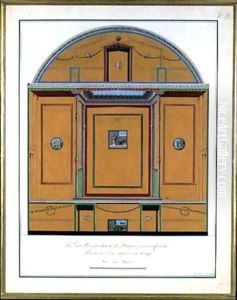Giuseppe Chiantarelli Paintings
Giuseppe Chiantarelli was an Italian composer and musician born in 1753 in Naples, which at the time was part of the Kingdom of Naples. He is known primarily for his work in church music, having composed a variety of sacred pieces, including Masses, Vespers, and other liturgical works. Chiantarelli's music is an example of the Neapolitan School's influence, which was a dominant force in Italian music during the 18th century, particularly in the realms of opera and sacred music.
Chiantarelli's life and career were deeply rooted in the rich musical traditions of Naples. He received his early music education at one of the city's prominent conservatories, which were famous for training some of the greatest Italian composers of the time. The conservatory system in Naples was rigorous, and it placed a strong emphasis on vocal music, counterpoint, and composition. These institutions were not only places for learning but also important centers for musical activity in the city.
Throughout the late 18th and early 19th centuries, Chiantarelli worked within the Neapolitan musical establishment. His career path was typical for a musician of his time, taking on roles such as maestro di cappella in various Neapolitan churches, where he would be responsible for the music performed during liturgical services. This position was prestigious and demanded a steady output of new compositions to suit the various feasts and occasions of the church calendar.
In addition to his sacred compositions, Chiantarelli may have written works in other genres, although these are less well-documented. The late 18th century was a time of great change in the musical world, with the classical style evolving into what would become the Romantic era. While Chiantarelli's music was firmly rooted in the classical tradition, any secular compositions he may have written would reflect the trends and tastes of the period.
Giuseppe Chiantarelli's death in 1823 marked the end of a career that spanned a significant period in European musical history. While he may not be as widely known as some of his contemporaries, his work contributes to our understanding of the Neapolitan School and the development of sacred music during a transitional period in Western art music. Unfortunately, as with many composers of his era, a significant portion of Chiantarelli's music may not have survived or has yet to be rediscovered and brought to modern audiences.
